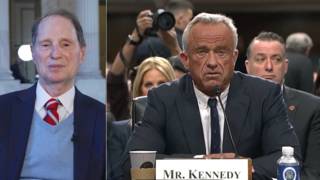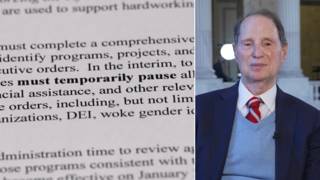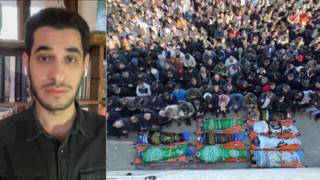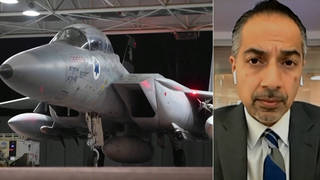
Related
Topics
We speak with investigative journalist Seymour Hersh who is reporting that the Pentagon has already secretly sent in forces to Iran to identify possible future military targets. According to Hersh, the president has authorized the Pentagon to send secret commando forces into as many as ten nations in the Middle East and South Asia. The secret forces could potentially carry out combat operations or even terrorist acts. [includes rush transcript]
Just days before President George W Bush’s second inauguration in Washington, a new report reveals the Bush administration’s intentions for military action against another member of his so-called axis-of-evil: Iran.
Investigative journalist Seymour Hersh is reporting in The New Yorker magazine that the Pentagon has already secretly sent in forces to Iran to identify possible future military targets. Hersh wrote that he had been repeatedly told by intelligence and military officials, on condition of anonymity that “the next strategic target was Iran.”
One government consultant told Hersh “The civilians in the Pentagon want to go into Iran and destroy as much of the military infrastructure as possible.” The secret reconnaissance missions have been underway since at least last summer with aided by Pakistan as well as Israel.
According to Hersh’s article, the president has authorized the Pentagon to sent secret commando forces into as many as ten nations in the Middle East and South Asia. The secret forces could potentially carry out combat operations or even terrorist acts. Bush reportedly used the Pentagon for the missions instead of the CIA to avoid having to report to Congress.
On Monday, the Pentagon criticized major aspects of the article, saying in a written statement “Hersh’s article is so riddled with errors of fundamental fact that the credibility of his entire piece is destroyed.” But President Bush told NBC News that he would not rule out taking military action against Iran.
- Seymour Hersh, Pulitzer Prize winning journalist for the New Yorker. His most recent article appears in this week’s New Yorker. It is entitled “The Coming Wars: What the Pentagon Can Now Do in Secret.” He is the author of “Chain of Command: The Road from 9/11 to Abu Ghraib.”
Transcript
AMY GOODMAN: NBC’s David Gregory sat down with the President at the White House and asked him about Iran.
DAVID GREGORY: About Iran, will you rule out the potential for military action against Iran, if it continues to stonewall the international community about the existence of its nuclear weapons program?
GEORGE W. BUSH: I hope we can solve it diplomatically, but I will never take any option off the table.
AMY GOODMAN: Seymour Hersh is on the line with us now, investigative reporter for The New Yorker magazine. Your response to what President Bush has said?
SEYMOUR HERSH: Well, I mean, that’s — the thing that’s wonderful about that is that, of course, if he really hopes we’re doing something politically, he should join in with the talks that have been underway for more than a year. Since 2003, the E.U., the European Union, primarily led by England, France and Germany, have been in extensive negotiations with the Iranians. I think there’s an understanding that Iran has ambitions to become a nuclear power. It’s not there yet. The goal of these talks is to offer them, I guess, to use a cliche, the carrot they need in terms of increased trade and increased credits and dual-use goods, goods that they have been denied by sanctions because of their activities, in exchange for a commitment to stop. The United States has not joined in those talks, absolutely has nothing to do with them. In the article, as I’m sure you know, I quoted senior western diplomats — everyone’s so nervous about being quoted about anything these days with this administration — anyway, a senior European diplomat said to me, we’re in a lose-lose position, because as long as America doesn’t join in these negotiations we really don’t have the leverage. What kind of a commitment can we make for Iran’s security if America stays out of it. And as long as they don’t join in, we’re — we’ll eventually going to have to go to the United Nations for sanctions because we can’t do it through diplomacy to stop them, and at that point, everybody understands that Russia and China will probably veto it, and then the Bush administration can claim, “A-ha, U.N. is not working again,” which is analogous to what happened in 2003 when we went into Iraq. We didn’t give the negotiations there a chance to work. So, if you really are interested in negotiations, it’s simple. Start talking to Iran.
AMY GOODMAN: Seymour Hersh, can you explain where the C.I.A. and the Pentagon fits into this picture?
SEYMOUR HERSH: Well, that’s actually to me the most interesting part to the story that I wrote, not about Iran, because you can almost argue that, of course, we’re doing surveillance. I’m sort of amazed that it became such a big story in the last 24 hours or 36 hours. The real issue is that in — what the story is about is the fact that the diminuation of the C.I.A. is unbelievable, the President has really gone after the agency with Cheney and Rumsfeld, and at this point, as I say, there’s never been more significant or more intellectual or more intelligence capability for not only operations, but for analysis. More is totally centralized in the White House and the Pentagon than since the rise of the national security state after World War II in the Cold War. We now have the White House and a Pentagon that basically dominates the process. The C.I.A. has been marginalized. All of the noise that you heard about the new C.I.A. director, Goss, going after people in the operations division, so-called dirty tricks division, really has masked what’s going on. His real mission, his real agenda — and it wasn’t his, he was carrying out a White House agenda — was to get rid of a number of analysts, senior analysts who work for the intelligence side of the C.I.A., old-timers who have been skeptical of many of the White House’s and Pentagon’s operations, and so, as somebody said to me, they really went after the apostates, and they want only true believers in there. That’s what the mission has been. The Pentagon now, under a series of Pentagon — on the series of presidential formal findings and also just declarations, you know — I think the President’s got a lot of legal power here. The way the world shakes down is this, when it comes to covert secret operations abroad. If the C.I.A. does it, under the law now they must tell the President. The President has to issue a finding approving it, and the Congress has to be told. The House and Senate Intelligence Committees have to be briefed. If the military does a covert operation, their interpretation of the law is simply that the President’s rights as Commander-in-Chief trump any other requirement. That is, the military is there to prepare the battlefield with these operations. This is a military deal, totally. Nothing to do with intelligence. No need to inform anybody. So, now Rumsfeld has won a major bureaucratic fight. He is now operating, as you said in the intro, in up to ten countries. He is sending in covert teams. That is — the word they use inside is “wiped clean.” The soldiers are wiped clean. Their I.D.'s are totally non-American and non-military. They're going in to make contact with groups inside various countries, set up operations, trying to do some war games, some terrorism themselves. You have to — you run with the bad boys to find the bad boys is the way somebody said to me. In other words, look like bad boys to attract other bad boys so we find out who they are. We can’t find the terrorists too often. This is one way of getting at them. And we’re going to be doing that with military people. We’re not going to be telling the American ambassador in the country. We’re not going to be telling the C.I.A. station chief. It’s going to be done by Rummy and his people. That’s a huge shift, an unprecedented shift, in the last 60 years.
AMY GOODMAN: Can you talk about, when it comes to Iran, the role of Pakistan and Israel?
SEYMOUR HERSH: Well, Israel’s role is simply to say, yeah, if you guys don’t do it, we’re going to do it. Nobody wants that. And so Israel is sort of there. Israel is playing it very cleverly, and they understand that a lot of Americans, pro- and anti-Israel, are troubled by the Israeli connection to this administration as it played out in the Iraqi invasion. There’s a lot of questions about whether Israel was a major player in this or a major factor. So, they don’t want that scene replicated in case we do something in Iran. So, they have been low-balling it, but the reality is they have been putting a lot of pressure. The message really to us is either you do it or we do it. Nobody wants them to do it. That would be chaotic. I don’t know why they think it’s much better for us to do it, but in any case — And so their role, the Pakistani role, is much more — much more devious in a way, much more complicated, because Musharraf is allegedly our ally in the hunt for bin Laden and all that. Meanwhile, he’s going along, making weapons, more nuclear weapons, but he has given us access to some of the Pakistani scientists who work in Iran. One of the things that we learned — one of the reasons we learned about Iran’s secret ambitions is the International Agency for Atomic Energy, I.A.E.A., the watchdog in Europe in Vienna, a non-proliferation regime, of which by the way, Iran is a member of the N.P.T., Pakistan is not. Anyway, I.A.E.A. announced a couple of years ago that they discovered there was cheating, you know, gambling on the premises, that not only was Iran cheating, but they had been working with the Pakistanis for years. That all ended, but Musharraf has given us some of the Pakistani intelligence, some of the information they know from their own work about where certain facilities are inside Iran. The exchange is we are laying off A.Q. Khan. A.Q. Khan is the sort of — the mythical, it’s not quite real, but we always call him the father of the Pakistani bomb, actually another man named Khan did much more with it. Nonetheless, A.Q. Khan was the guy that generated the dual-use goods, the materials they needed to get nuclear in the 1970s and 1980s. He is a famous person, and he was caught out in Libya doing this kind stuff a couple of years ago. There was a public ceremony where Musharraf had him — A.Q. Khan went and apologized. Now he has been under house arrest. Musharraf has not given us or the I.A.E.A. in Vienna access to this guy. So we don’t know what he’s doing. My friends inside tell me we made a Faustian bargain. We told Musharraf, give us the intelligence we need to get more information about sites, nuclear sites, the suspected sites in Iran, and we will not pressure you on A.Q. Khan, coughing him up to us or the I.A.E.A. And meanwhile, of course, Musharraf is making more bombs. My other people tell me that people that know Pakistan, former Pakistanis tell me that he’s going and doing more work with the plutonium route. And, of course, they’re into the international black market buying the parts right now. So it’s amazing. We’re sort of playing the short run game. We need the intel. I think the reason we need the intel is simply this, this president — you just have to listen to what he says — in the Washington Post last weekend an astonishing interview, he’s going ahead with the war on terror. He’s continuing to do what he thinks is right to bring democracy. He almost basically — Iran, he said, is eagerly — they’re eagerly awaiting our help in becoming secular, or something like that, he said in, the Washington Post. I think we don’t want to get the wrong targets. We don’t want to be embarrassed again as in Iraq with not coming up with W.M.D. when we need to. I think it all sort of fits together.
AMY GOODMAN: We’re talking to investigative reporter, Seymour Hersh. We have to break for just one minute. When we come back, I want to ask you quickly, about the conviction of Charles Graner, and also about Jerry Boykin’s role in plans for Iran.
[break]
AMY GOODMAN:As we continue our discussion with investigative reporter, Seymour Hersh. His latest piece is in The New Yorker magazine this week. It is called, “The Coming Wars: What the Pentagon Can Now Do In Secret” and talks about Pentagon plans to deal with Iran. Is it fair to say to attack Iran? Seymour Hersh?
SEYMOUR HERSH: Yeah, I think that’s fair to say. Of course they’re planning to attack Iran. The goal of the — the, you know, what we always call the neo-conservatives — the Paul Wolfowitzes and Doug Feiths in the Pentagon, the civilian leadership in the Pentagon. Their theory is: Look, one of the things They’ve learned in Iraq (they have learned something) which is that regime change by overwhelming force isn’t working so well. So the goal in Iran, since it’s also three times as large as Iraq, and it does have a large secular population and there’s a lot of reason to believe that if we hadn’t gone into Iraq, there would be a lot of dissent right now in Iran over the leadership; but nonetheless, I think their thinking is, that if we hit three or four dozen targets in the spring — [sneezes] excuse me — in the summer, late spring or summer, which I think is the tentative plan — that would be roughly at the time Sharon is beginning his pullout of Gaza, and so their — the theory is in the Pentagon there would be more good feelings towards America in the Muslim world once this begins. And if Iraq can be stabilized, which they think it will (I don’t know why, but they do.) after the elections, if that gets stabilized, then the goal is you hit three or four targets quickly and cleanly and you be sure you’re right and you have evidence to show that the Iranians are cheating more than they might — than the world [inaudible] knows, this could lead to the secular population, those millions of young people, et cetera, who don’t like the clerical leadership, to overthrowing or beginning to agitate against the mullahs once again. And the only problem with that thinking, of course, is that it’s pretty much unique to those group of civilians in the Pentagon; because almost everybody else I talked to, in and out of the government, were scathing in their critique of this, saying it’s absolutely hogwash, that what’s going to happen, of course, is that the White House and the Pentagon is ignoring the nationalism that exists, the enormous feelings of togetherness inside Iran and love for country. And, essentially, the reason I think people talk to me — because it’s very clear with this group that’s now in the White House and in the Pentagon, you can’t get to the meetings unless you drink the Kool-Aid. And so, if you don’t agree with them, you can’t get in. And so, yeah, I think they really believe this is one way — sort of on the cheap, without committing a lot of troops, an air raid, maybe some commandoes, you know, some guerrillas, American S.E.A.L.S or other teams go in with the Israelis, some of Israeli commando units go in to certain targets about which we’re not clear. But, basically, they think that’s the ticket.
AMY GOODMAN: What are the other countries that the Pentagon is operating secretly in?
SEYMOUR HERSH: Well, you know, unfortunately, one of the things I do is, I like to avoid writing about anything where there’s any chance that Americans there, this — you know, I can’t say there’s any Americans going in and out of Iran right now. I know it started last summer, so that’s — there’s plenty of protection there, besides which, they don’t go in as Americans; but in the other countries, the countries I name, I can tell you we just did something in Algeria. What we are doing is we’re sending in teams that are completely disguised as terrorists, and their — the C.I.A. has a number of rules they have to live by, which is they cannot, under the rules, they cannot have their assets, their people, posing as journalists or clerics. And there’s no such rules for the Pentagon. So, you know, the military people going in could be journalists, they could be religious people, they could be plain tourists undercover. And I think North Africa is a place of enormous interest for us, because we — the Bush administration believes there’s a lot of al Qaeda or al Qaeda-like terrorist activities there. So, that’s an area of concern, you know, Egypt, Algeria, Morocco, Tunisia. Obviously, they’re still interested in the Philippines and Indonesia, and there’s other countries where we have an enormous amount of interest.
AMY GOODMAN: The government has finally responded to your piece, if it didn’t when you actually were calling the White House for response, saying, “It’s so riddled with errors of fundamental fact that the credibility of [your] entire report has been destroyed.”
SEYMOUR HERSH: Yeah. I heard that.
AMY GOODMAN: Your response?
SEYMOUR HERSH: Well, I mean, my response is pretty much the same as, I must say, even the mainstream media. To their everlasting credit it is all pointed out that while it’s wonderful to go after me personally, none of the attacks dealt with the substance of what I was writing about. Are we operating in Iran? Is there a new understanding of what the Pentagon can do? All of that is not dealt with. So, you know, I’m really very untroubled by what the Pentagon spokesmen say. I think that when I did my stuff on Abu Ghraib and suggested that what was going on in The New Yorker, I suggested, and there were a bunch of articles I wrote, suggesting that what went on in Abu Ghraib was certainly not just there, it went on into Guantanamo in Cuba, into Afghanistan and other places in Iraq and led to the highest leadership. When I wrote that stuff, they accused me of throwing mud up, I think it was mud, against the wall and seeing what sticks. So, you know, we can just — you know, I — you know, you cannot worry about what public relations people say.
AMY GOODMAN: Speaking of which, the conviction of Charles Graner, sentenced to ten years in prison for torture at Abu Ghraib.
SEYMOUR HERSH: Well, there’s a couple of thoughts. One, of course, is that just last week, somebody got one year for murdering somebody in Iraq. It was a manslaughter case. So there’s always a question of somebody else who plead guilty got eight years, which are most of the people who committed — who shoot prisoners are getting three years or so. There’s that question of that, the fairness of the sentencing. Look, Graner was obviously — was certainly at fault, moronic, etc., but until this government — he is — there are eight people have now been accused of activities in Abu Ghraib. A couple have plead guilty, three or so, a couple are waiting trial, and a couple are found guilty. They’re all enlisted people. This is an operation that — what happened in Abu Ghraib, which was excessive, went on for three or four months. Everybody knew what was going on in the night shift at the prison. I’m sure the same thing was going on in the day shift. Officer after officer was — there’s all sorts of allegations about visiting the site. As even including the major general or the three-star general in charge of the whole Iraqi operation. So, we have all of — Sanchez, I’m talking about. We have all of these allegations. Not one officer has been charged. Graner’s defense was moronic, but one of the things his lawyer did raise, they tried very hard to get some officers as witnesses, and of course they all plead — the military equivalent of the fifth and they were excused. They didn’t testify. So we really don’t — this trial doesn’t do anything to get us — I thought the coverage in The Washington Post, by the way, which I read — I thought was really quite brilliant because they kept on focusing in the trial, the Graner trial, about higher-ups. I didn’t see as much of that in the Times unfortunately, but in the Post, it was really terrific coverage. Because that was the real theme of what Graner was saying, is there were a lot of other people involved. Until we deal with that in a legal way — the army — and prosecute some people — you know, we’re still in the scapegoat business here. You know, I — it’s hard to have much sympathy for Graner, but I learned when I did a lot of work on My Lai, I initially started out thinking all those kids in Lieutenant Calley’s company who murdered people were the worst sort of people. In the end, I came to realize they were as much victims as the people they executed, because of the wrong war, wrong time, wrong training, wrong everything. And there is a lot more responsibility than just Charlie Graner.
AMY GOODMAN: And your belief in having written Chain of Command, the book, how far up it goes?
SEYMOUR HERSH: Oh my god, I don’t think there’s any question that I would never say that anybody in the White House or Pentagon knew. Civilian leadership knew what was going on in Abu Ghraib, but that everybody from the President on down understood that as — the cliche was, the gloves are off. Rumsfeld kept on saying that we were going to get very tough with prisoners. There’s no question, it was widespread inside, and as you know, as you remember, we talked about it, the book I wrote begins with the meeting with Condoleezza Rice about this issue. There was a lot more high-level information. You know, this President’s hard for to us reach. We don’t know — we don’t know where he is at any time. But I am increasingly convinced, and I have enough data that I’m getting. I’m just talking, not writing, that the President, when it came to prisoner interrogation issues and the intelligence from it and operational stuff, is much more actively involved in a way we don’t see than we might think. We always see him as sort of not really getting tuned in. I think in this stuff, he’s really more tuned in, but I — you know, I have to prove that.
AMY GOODMAN: Finally, as we move into the Condoleezza Rice confirmation hearings today in the Senate, that opening scene in your book, Condoleezza Rice.
SEYMOUR HERSH: Yes. Condoleezza Rice convenes. She was convinced, to her credit, to hold a meeting on all these allegations that came out of Guantanamo, a C.I.A. official going down to Guantanamo. We’re talking about in the summer of 2002. Six, nine months before the invasion of Iraq, long before Abu Ghraib, went down without clearance. Went down and just spent time. Most of the Congressional people and other visitors to Guantanamo were seeing what amounted to Potemkin Village. They would clean it up and give them the show and tell and hide what was really going on, the kind of daily brutality. He saw it and wrote a report. It got circulated. He was in the C.I.A. It ended in Condoleezza Rice’s hands. People with a lot of integrity inside the N.S.C., National Security Council, insisted that it be dealt with. She convened a meeting. Rumsfeld came. He said he would do something about it. Nothing happened. Everybody was disillusioned. Everybody knew, and it just kept on going. It just never — you know, it’s one of those issues. She did have a meeting about it, but nothing happened. It just sort of whittled away, and people kept on whacking people. So, the guys in the inside in the White House, including a four-star general, were discouraged by it. And then when I wrote about Abu Ghraib, I learned about all of this, and that was what I wrote about. That’s actually the whole scene, the first 30 or 40 pages of the book is about this. Where does responsibility lie? Condoleezza Rice was not at Abu Ghraib sticking feathers in people, but she certainly knew in general that things were not basically going right, and we were mistreating prisoners, and also it’s real simple. Two simple rules every military guy knows. One is you don’t do to them what you don’t want done to your soldiers. And two, you cannot get good intelligence from people that want to fly airplanes into the buildings to kill the infidels, to kill us. You can’t get it by pushing them around. They have a story and they will just give you the story. You have to convince them otherwise. You have to establish rapport. Everybody knows that. That’s one of the — anybody who argues that torture is acceptable is really missing the boat on that issue. Most of the really good guys in the profession, which is one reason some of the guys in the F.B.I. protested so much, because they knew that you — you know, if you are rational and smart, you don’t get it by pushing people around. In any case, you know, it remains — I must say in the last six months, thank god for the American A.C.L.U., and Human Rights Watch, and Amnesty International, they have really pressed this issue. There’s a group, a bar group in New York, Scott Horton involved in it, a legal group that’s also doing a lot of work. People at N.Y.U. There’s an awful lot of stuff going on now to try and hold, you know, in some way, because Congress isn’t going to do it. The one thing we know is Congress is not going to do its job.
AMY GOODMAN: Seymour Hersh, I want to thank you very much for being with us. Investigative reporter, wrote the latest piece in The New Yorker magazine.












Media Options